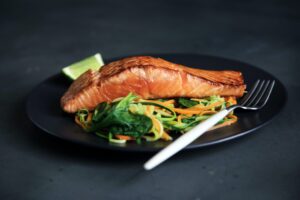Many women diagnosed with fibroids—non-cancerous tumors in the uterus—want pain relief and help with fibroid symptoms like long, heavy periods. But many women would also prefer to avoid medical interventions. So, as Houston area fibroid specialists, we are often asked: can everyday changes help me find relief from fibroid pain?
Well, here’s the deal: changes in diet, exercise and self-care won’t cure your fibroids. But, there are some tweaks you can make to your everyday routine that could keep your fibroids from getting bigger. And others may make your fibroid symptoms more manageable. Let’s take a closer look.
While the science on this matter is still not conclusive, evidence suggests that some foods can help shrink your fibroids, while others will potentially make them worse.
In a new study released in the journal of Fertility and Sterility, researchers studied over 80,000 pre-menopausal women between the ages of 24 and 42. Since their enrollment in 1989, researchers followed these women, monitoring their diets...and observing any fibroid development. During the 18-year study period, just over 8000 of these women developed fibroids. And what they discovered was interesting. While a generally high-fat diet didn't appear to affect fibroid risk, there were two exceptions. Women who ate polyunsaturated fatty acids and trans fatty acids did develop fibroids more frequently. Some of the worst-offending foods include shortening, frozen dough, frozen pizza and microwave popcorn.

Research also suggests that highly caloric diets full of red meat and sugar can increase your risk of developing fibroids. In order to minimize your risk, then, you could try replacing red meats with leaner cuts like chicken or turkey. Better yet, you could try getting your protein from plant-based sources like beans or the new and widely-beloved Impossible or Beyond Burgers.
Some other problem foods to cut from your fibroids diet? Dairy can influence your hormones, so removing cheese, butter and even milk could help ease symptoms. Finally, getting rid of foods that trigger inflammation, including gluten and highly processed carbohydrates, may help you find relief.
Seems like this lifestyle change is too good to be true? Some women have been inspired by their fibroids diagnosis to majorly change their diets. That was the case for Sweetkiwi founder Ehime Eigbe, who started her entrepreneurial journey to create tasty, healthy frozen yogurts that help your body absorb proper nutrients after struggling with fibroids herself.
She told Black Enterprise, “I started doing some research and found that food could be a good way to change a diagnosis. I started learning about nutrition and how our body needs the right kind of nutrition to support cell regeneration, armed with so much information, I decided to change my eating habits and adopt a healthier lifestyle.” And guess what? Like Eigbe says, dietary changes can make a big difference in so many areas of your health.
Many women with fibroids experience painful periods. But for any woman whose time of the month is incredibly painful, the North American Menopause Society suggests removing certain foods and adding others can help make periods less intense.
So, what are their dietary recommendations? They suggest steering clear of coffee since caffeine constricts your blood vessels, which could intensify cramps. At the same time, they want you to add anti-inflammatory foods such as salmon and vegetables, since, according to a peer-review of existing research, a diet high in omega-6 fatty acids may reduce period pain.
We hope this is good news for anyone who suffers from dysmennorhea. And we know it will be helpful to fibroid sufferers. Because, as it turns out, many of these foods can also help reduce other fibroid symptoms.
According to the American Journal of Clinical Nutrition, getting Vitamin A from animal sources may help reduce your fibroid risk. Also, they found that eating more fruit can help lower your fibroid risk factor. The study further noted that African American women are far more likely to develop fibroids, and tend to have diets lower in these fibroid-fighting foods and vitamins.
If you want to add fibroid-fighting vitamins to your diet, try including:
Food-based vitamin sources are best for absorbing your fibroid-fighting vitamins. But, if making changes to your diet isn’t an option, vitamin supplements are still a great choice.

Exercise in and of itself doesn’t stomp out fibroids. But getting your sweat on can reduce your BMI (body mass index.) It will also help eliminate fat stores in your body. And both of those factors will make it easier for your body to process estrogen hormones.
In turn, this can help lower your fibroid risk, since high levels of estrogen in the body can increase your risk of developing new fibroids, or of seeing your existing tumors get larger. So check out these workouts to try if you have fibroids.
When you live with fibroids, you may develop anemia, severe pain, or problems when you pee. And you will need to address those issues with your doctor, But, when it comes to managing your chronic pain before fibroid treatment, The National Center for Complementary and Integrative Health has some helpful suggestions. Some top tips include acupuncture, which is an ancient Chinese therapy that uses small needles, inserted to your skin at specific accupoints. Another suggestion? Try yoga, a flowing, low-impact exercise that can boost your fitness while also offering you helpful breathing exercises. Additionally, deep breathing, meditation and therapeutic massage can all offer temporary relief. Still, in order to find permanent fibroid pain relief, you'll need to treat your fibroids, not just your symptoms.
When fibroids are small, lifestyle changes can certainly help you keep fibroids in check so you can live your normal life. But when tumors grow large, or your symptoms are severe, targeted fibroid treatment will be a better option. Contact our Houston fibroid specialists today to see if our minimally invasive treatment protocol is your best option.
Sources: Health.Harvard.Edu, mayoclinic.org, Journal of Fertility and Sterility
As leading fibroid specialists in Houston, we can help you get back to doing the things you love – free of pain and symptoms associated with this diagnosis.

Scheduling
Please contact our dedicated specialists to schedule a consultation today.
2025 Houston Fibroids. All rights reserved. Website Design by Healthcare Success